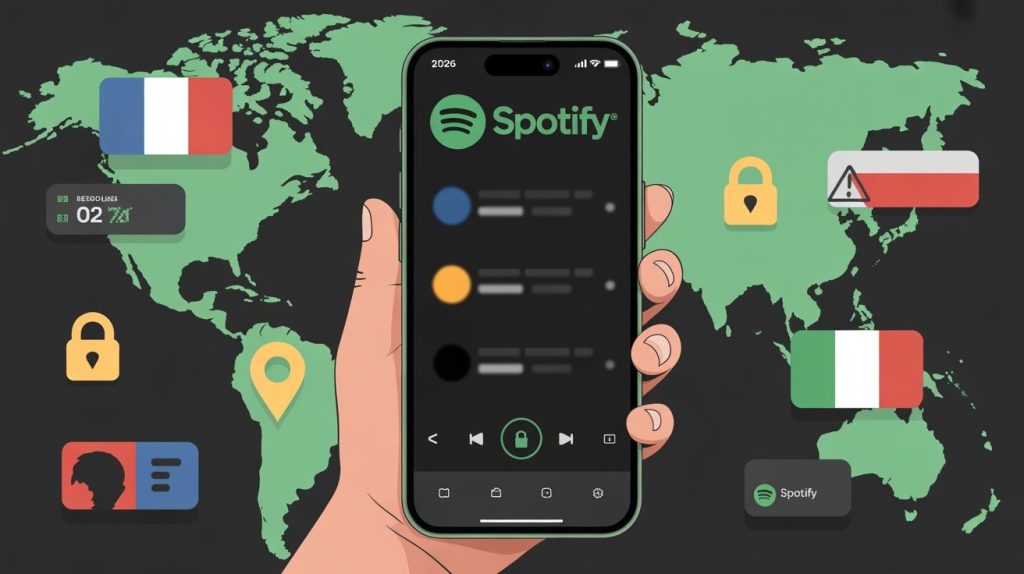
Spotify has long marketed itself as a “global” music streaming service — a place where you can access millions of tracks from around the world. But in recent years, and especially heading into 2026, many users are noticing that Spotify doesn’t always feel so global after all.
Instead, the experience is increasingly shaped by region-locked features: certain songs, playlists, features, or content that are available in some countries but not in others. Even for paying subscribers, being in a particular country—or even updating your payment method—can significantly change what you see in your library.
This shift reflects new licensing deals, regulatory pressures, and changes to Spotify’s internal policies. For users, it means what was once an almost universal catalog is increasingly being tailored — or restricted — by location.
What is “Region-Locking” on Spotify?
At its core, region-locking on Spotify Mod APK Latest Version means that different parts of the app behave differently depending on where you live. Examples:
- Some tracks or albums available in one country might be absent in another.
- New or premium features (e.g. experimental features, audiobooks, certain novel tools) may only roll out in select countries.
- Access is now tied more strictly to the user’s “country of residence” — meaning regions, payment method, and account settings determine what you get.
These limitations apply not only to free users, but increasingly to Premium subscribers as well — meaning even paid users may face restrictions based on region.
Why Spotify Is Doing This: Licensing, Legalities, and Business Strategy?
Licensing & Copyright Complexities
Music and audio rights are often negotiated per country or region. That means a track that’s licensed in the U.S. might not have legal permission to be streamed in, say, Pakistan or Kenya. As licensing deals expire, change, or only cover certain territories, tracks must be added — or removed — from those regions accordingly.
Similarly, newer content types — like audiobooks or video-backed songs — often require separate licensing. As of 2025, audiobooks remain unavailable in many countries, even for Premium users.
Regulatory, Tax, and Local Compliance Considerations
In some markets, local laws — around censorship, royalties, taxation, or content compliance — may limit what Spotify can legally provide. To comply, Spotify may choose to restrict certain content in those regions rather than negotiate complicated global licenses.
Business and Monetization Strategy
Another factor: by tying content and features to region, Spotify can adjust pricing, plans, and offerings to local economic conditions. For example, subscription price hikes have recently been announced across several regions.
Also, rolling out new features selectively allows Spotify to test them in some markets before a full global launch — but it also means many users will have to wait, or may never get certain features. According to some user complaints, there are parts of “Premium” functionality (like AI-powered tools or early-release playlists) that remain region-locked.
What’s New for 2026: Stronger Regional Enforcement?
Several developments in 2025 and beyond suggest Spotify is doubling down on regional enforcement — with ripple effects in 2026.
- Under a recent policy update, Spotify now requires that your account must be tied to your country of residence. That means attempts to “region shop” — or pretend to be in a different country to get access to cheaper pricing or wider libraries — are explicitly blocked.
- The company appears to be using this policy as a deterrent against users who use VPNs, third-party apps, or other workarounds to access foreign libraries or bypass regional restrictions.
- Additionally, certain advanced features — experimental tools, early releases, or features rolled out slowly — are reportedly being withheld from some regions, even for Premium users.
The result: by 2026, many longtime Spotify users may find that their playlists, favorite songs, or features simply “disappear” — or become unavailable — when they travel, move, or change payment methods.
Impact on Users: What It Means in Practice
For Casual Listeners
If you listen mostly to mainstream international music or local hits, you might not notice much change. Popular, globally licensed songs generally remain available everywhere.
For Avid Music Fans / Niche Listeners
If you enjoy indie, niche, older, or region-specific music, the impact can be significant. Many deeper cuts, local albums, or lesser-known artists may not be available outside certain regions — meaning your library might be fragmentary or inconsistent depending on where you are.
For Users Who Travel or Relocate
Given the stricter “country of residence” rule, traveling or relocating can cause disruption. If your account country and payment method don’t match your actual location, you may see your available catalog and features change — regardless of whether you have Premium.
For Families & Younger Users
Even features built for families — such as managed child accounts on a Family Plan — may behave differently region to region depending on local licensing and feature rollouts.
Wider Effects: On Artists, Creators & the Global Music Ecosystem
Spotify’s region-locking doesn’t just affect listeners — it also shapes how artists and creators reach global audiences.
- A song released globally may not reach listeners in all markets, limiting its potential reach and revenue. Licensing restrictions or regional deals may fragment a release’s availability.
- For global playlists or collaborative works, users in some regions may lack access — which can hurt discoverability for emerging or independent artists in restricted markets.
- On the business side, region-specific pricing and licensing strategies might help Spotify manage costs and royalties, but they also cement inequalities in content access across different parts of the world.
Why This Trend is Gaining Momentum in 2026?
Several factors make 2026 a turning point for regional restrictions on Spotify:
- The growing complexity of global music rights and licensing — with more artists, labels, and regional deals — makes a universal catalog increasingly hard to maintain.
- Spotify’s recent policy update tying accounts to residence signals a shift away from flexibility toward tighter enforcement.
- As Spotify expands into new content types — video podcasts, audiobooks, international releases, localized content — the need to compartmentalize catalogs regionally becomes more pressing.
- Economic pressures, including subscription price adjustments in different markets, also incentivize region-based plans rather than a one-size-fits-all global model.
Conclusion
Spotify’s vision of “music for everyone, everywhere” now comes with a caveat: “as long as you’re in the right region.” In 2026, region-locked features are shaping up to become standard — not exceptions. For users around the world, this means:
- Your listening experience may differ significantly from someone in another country, even with the same Premium plan.
- Music availability, features, and releases will depend on licensing deals, local laws, and Spotify’s rollout strategy.
- For travelers, relocating listeners, or enthusiasts of niche music, this fragmentation could become a source of frustration.
As the streaming world becomes more complex, regional boundaries are reasserting themselves. For Spotify users in 2026 — wherever you are — it’s worth being aware that access is no longer universal.
